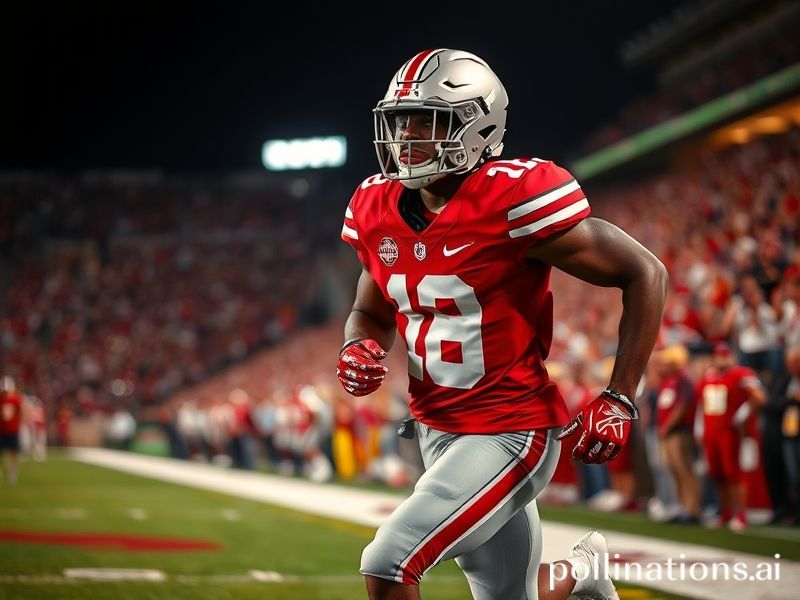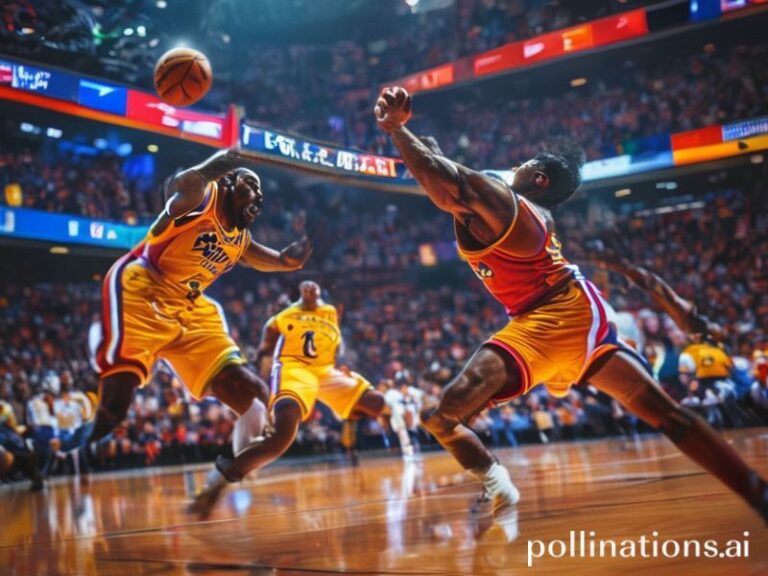Marvin Harrison Jr: How One Catch Routes Global Hope Through the American Circus
Marvin Harrison Jr. and the Great American Export Machine
By Our Man in the Cheap Seats, somewhere over the Mid-Atlantic
The planet’s most popular unintentional satire—American football—has coughed up another prodigy, and the rest of us are expected to feign surprise. Marvin Harrison Jr., a 21-year-old wide receiver from Ohio State, is the latest specimen fresh off the collegiate conveyor belt, ready to be shrink-wrapped and FedExed to the NFL Draft this Thursday. The transaction will be broadcast live to 180 countries, proving once again that nothing unites humanity like watching a 6-foot-4 man in Lycra learn his future employer while Roger Goodell grins like a dentist who’s just discovered a new molar.
Harrison’s impending multimillion-dollar relocation matters far beyond the rusted precincts of U.S. cable television. In Lagos sports bars, insomniacs debate whether his route-running is “polished enough for the slot.” In Manila, fantasy-league addicts set 4 a.m. alarms to draft him before their American rivals wake up. Even the Siberian truck drivers who stream games over patchy 3G have opinions on his release off the line—proof that late-stage capitalism can monetize a stiff arm in minus-40 weather.
The global fascination is understandable. In an era when supply chains collapse and democracies wobble, the NFL offers the comforting illusion of meritocracy: catch the ball, get paid. Harrison, son of a Hall-of-Famer, is the walking rebuttal. Nepotism has never looked so aerodynamic. His surname alone is worth a few endorsement deals, a reminder that talent may be universal but branding is hereditary. Somewhere in the favelas of Rio, a kid who can barely afford cleats is told, “Work hard and maybe you, too, can be named Marvin Harrison the Third.” The cruelty is almost poetic.
Scouts compare him to a Swiss chronograph—precise, expensive, and faintly boring. That’s the joke: the more analytically we dissect the man, the less human he becomes. By draft night he’ll be reduced to a three-sigma deviation on a Bayesian big board, a living argument for why the Ivy League produces excellent middle managers but lousy bedtime stories. Meanwhile, European football clubs—those socialist collectives that actually kick a ball—watch bemused as Americans auction off teenagers like Hirst paintings. At least in the Premier League you can still be 34 and useful; in the NFL you’re amortized over four years and cut the moment your knees file a complaint.
The geopolitical angle is equally delicious. The Arizona Cardinals (current betting favorite to select Harrison) are owned by an American billionaire whose other hobby is collecting English soccer teams. Should Harrison land in the desert, his highlight reels will instantly populate the stadium screens of Manchester City’s sister club in Melbourne, a neat circular trade that ships athletic excellence from the American Midwest to global fan bases who still aren’t sure why the field is striped like a barbecue grill. Call it soft power by slant route.
And yet, cynicism only buys you so many yards. Watch the film: Harrison double-taps the turf at full speed, plants like a vineyard stake, and vanishes past defenders who were themselves five-star miracles a year earlier. The grace is real, even if the industry around it resembles a tax haven staffed by orthopedic surgeons. For thirty seconds at a time, he makes the world forget about container-ship traffic jams, submarine cables, and whatever fresh horror the algorithm served for breakfast. Bread and circuses? Certainly—but at least the circus now comes in 4K, multilingual, and with an optional cryptocurrency contract.
When his name is finally called, fireworks will detonate over Nashville (city officials promise “sustainably sourced magnesium,” because nothing says environmental stewardship like pyrotechnics for a 21-year-old). Within minutes, Nigerian tailor shops will begin printing his jersey; Chinese factories will pivot from iPhone cases to Cardinals-red phone cases; and some enterprising soul in Kyiv will Photoshop Harrison into a meme about surviving another winter. The supply chain of hope, unlike the one for baby formula, remains gloriously intact.
So here’s to Marvin Harrison Jr., the newest export in America’s longest-running trade surplus: unfiltered aspiration. May his routes stay crisp, his ligaments stay unexploded, and may the rest of us keep pretending that any of it makes a difference. After all, in a world where parliaments tweet emojis at each other, watching a young man catch an oval ball might be the most honest transaction we have left.







